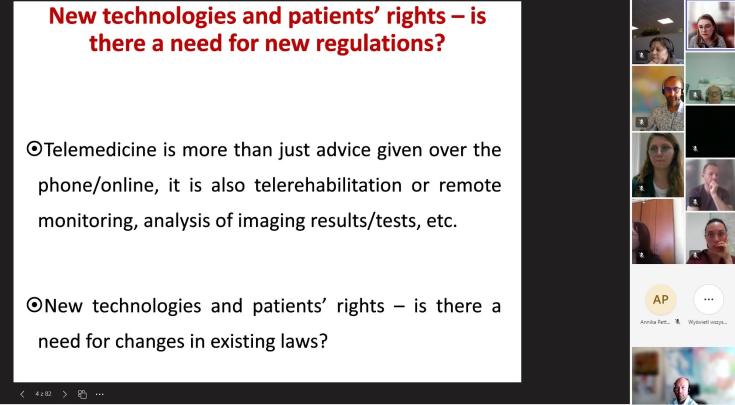Legal Aspects of Telecare, Telemedicine and AI in Healthcare

The workshop titled Legal Aspects of Telecare, Telemedicine and Artificial Intelligence in Healthcare was organized as part of the CARES project (Interreg Europe) and focused on discussing key legal issues related to the implementation and application of new technologies in healthcare. Participants had the opportunity to explore current challenges and regulations concerning telecare, telemedicine, and artificial intelligence (AI) in the healthcare sector.
1. Current Legal Issues
The first part of the workshop addressed current legal issues arising in the context of applying new technologies in healthcare. It was noted that technological advancements are progressing faster than the law, leading to numerous gaps and legal uncertainties. Discussions centered on topics such as liability for medical errors in telemedicine, the protection of patient data, and challenges related to ensuring equal access to services provided remotely.
2. Overview of Key EU and National Regulations
The next significant topic covered was an overview of major legal regulations at both the EU and national levels related to new technologies in healthcare. Experts emphasized the importance of properly implementing data protection laws, ensuring accountability in remote healthcare services, and the need to adapt existing regulations to the specificities of the healthcare sector. The necessity of harmonizing regulations to create a coherent legal framework that supports innovation while ensuring patient safety was highlighted.
3. Practices (Good and Failed) in Telecare, Telemedicine, and AI in Healthcare
During the workshop, participants explored practical examples of implementing telecare, telemedicine, and AI in various healthcare systems. Both successful and unsuccessful practices were discussed, providing valuable insights for future developments. Successful practices included programs that increase access to healthcare, especially in underserved areas, and AI tools that support diagnosis. Unsuccessful implementations were often linked to inadequate legal preparation, insufficient risk assessment, and poor communication with patients.
4. Case Analysis – Legal and Regulatory Aspects
The final part of the workshop was dedicated to analyzing specific cases related to the use of telemedicine and AI, which involved significant legal and regulatory issues. Cases were examined that involved medical errors due to improper use of technology and challenges associated with cross-border healthcare services. These discussions highlighted the importance of implementing new technologies with careful consideration of all legal aspects to ensure patient safety and build trust in the healthcare system.
Summary
The workshop, organized as part of the CARES project (Interreg Europe), provided a valuable platform for sharing knowledge and experiences regarding the legal aspects of telecare, telemedicine, and artificial intelligence in healthcare. It was emphasized that while new technologies have the potential to significantly improve healthcare quality, their implementation requires robust legal frameworks to ensure adequate protection for both patients and healthcare providers. The event concluded with the recognition that ongoing adaptation of regulations to evolving technological conditions and promoting good practices at the international level are essential for the development of modern healthcare.